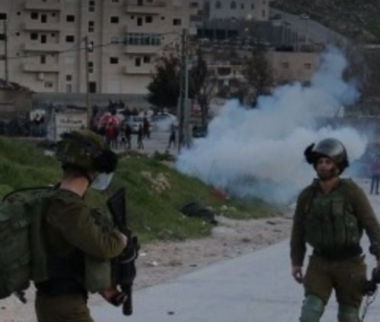Israeli forces attacked, on Saturday, the funeral home for the three slain Palestinians killed by the army on Friday in Idhna town, west of Hebron in the southern occupied West Bank, and abducted three people, in addition to three in Masafer Yatta to the south.
Before dawn on Saturday several military vehicles stormed many neighborhoods in the towns of Surif and Idhna, northwest and west of Hebron.
It was later reported that soldiers broke into and ransacked the homes of the three slain Palestinians in the town of Idhna, west of Hebron, abducted the father of one of the slain young men, Ahmed Jahisha, destroyed his vehicle, assaulted family members, and confiscated their vehicles.

On Friday, Israeli forces shot and killed two Palestinian children and a young man, identified as Mahmoud Arafat Yousef Abu Jahisha, 16, Adi Isma’in Yousef Abu Jahisha, 16, and Ismail Ahmed Yousef Abu Jahisha, 19, inside the illegal “Adora” colony after an alleged shooting attack which left one settler injured.
The army invaded Surif town northwest of Hebron, searched several homes, confiscated more than thirty vehicles, and abducted Mahmoud Daoud Aghanimat, 32, and Ghassan Rashid.
On Saturday afternoon soldiers attacked the funeral home for the slain Palestinians in the town of Idhna, sparking protests.
Soldiers opened fire with live rounds, rubber-coated steel rounds, concussion grenades, and tear gas canisters causing several people to sustain inhalation injuries.
Occupation forces broke chairs at the funeral home, forced mourners to leave, and warned loved ones not to hold a funeral or to raise banners or flags.
In related news, Israeli troops stormed, on Saturday afternoon, the town of Deir Samet west of Hebron, sparking protests.
In response to resistance, the army fired tear gas canisters causing several people to suffer the toxic effects of tear gas inhalation.
Furthermore, the army stormed the village of Al-Halawa in Masafer Yatta, south of Hebron, and abducted Sanad Ahmed Abu Aram, Fares Ismail Abu Aram, and Haitham Abu Rajab while they were on their land.

